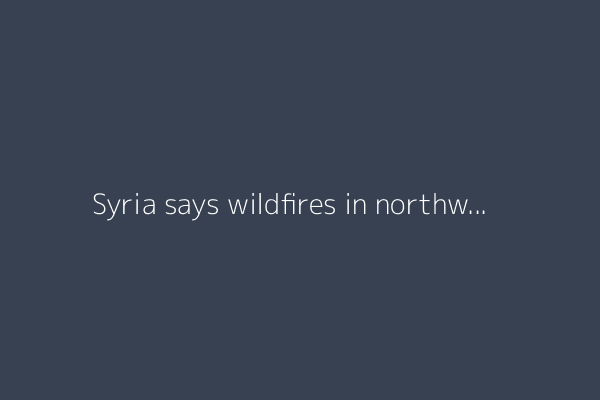See what’s trending right now
Climate changein World Affairs
6 hours agoWildfires in Syria are contained after a prolonged battle, while debates on air conditioning's environmental impact heat up, and a Chinese breakthrough offers hope by converting CO2 into sugar.
Show me
World Affairs
Syria says wildfires in northwest Latakia province contained after 10 days
NeutralWorld Affairs
After burning for over a week, wildfires in Syria's northwest Latakia province have finally been brought under control. The Syrian government credits international assistance—firefighting teams from Turkey, Jordan, Lebanon, Qatar, and Iraq—for helping contain the blazes.
Editor’s Note: Wildfires are becoming a recurring nightmare in the region, worsened by climate conditions. While cooperation between Syria and neighboring countries (some with strained diplomatic ties) is notable, the story highlights how vulnerable the area is to environmental crises—and how reliant it is on outside help when disaster strikes.
How do I feel about air conditioning? I’m very hot – but it’s destroying the planet | Emma Beddington
NegativeWorld Affairs
Emma Beddington captures the brutal irony of modern cooling: as heatwaves become unbearable, our reliance on air conditioning creates a vicious cycle—more AC use pumps out more CO₂, worsening the very problem we’re trying to escape. She paints a darkly funny scene of sweltering misery (sticky limbs, a wheezing fan) while calling for long-term solutions beyond just cranking the thermostat.
Editor’s Note: This isn’t just another "AC is bad" rant—it’s a relatable dilemma. As heatwaves intensify globally, our survival instincts clash with the reality that cooling tech fuels the crisis. Beddington’s personal struggle mirrors a collective question: How do we stay cool without cooking the planet? It’s a tangible example of how climate change forces impossible trade-offs in daily life.
Chinese team says carbon dioxide can be turned turned into sugar
PositiveWorld Affairs
A team of Chinese scientists has cracked a way to turn methanol—a substance that can be made from captured CO₂—into plain old sugar. Instead of relying on traditional sugar crops like cane or beets (which guzzle land and water), their enzyme-powered method could one day turn industrial waste or excess CO₂ into edible sucrose. It’s still early days, but the implications are pretty sweet.
Editor’s Note: Imagine turning pollution into dessert—this research hints at a future where sugar production doesn’t compete with farmland or worsen resource scarcity. While it’s not hitting grocery shelves tomorrow, the idea of repurposing CO₂ into food could reshape how we think about sustainability, industry, and even climate solutions. Plus, it’s a clever two-for-one: tackling emissions and food security.
Turkey, Jordan send firefighters to Syria as wildfires burn for fourth day
NegativeWorld Affairs
Wildfires along Syria’s coast have been raging for four days, prompting an international response. Firefighters from Turkey and Jordan have joined Syrian teams, using helicopters to combat the flames from the air. The U.N. is also on the ground, with efforts focused on protecting the ecologically important al-Frunloq forest reserve.
Editor’s Note: Wildfires don’t stop at borders—this is a regional crisis with environmental and humanitarian stakes. Syria’s already fragile infrastructure makes outside help critical, and the threat to al-Frunloq’s forests could have long-term ecological consequences. Cooperation between countries, even amid political tensions, shows how disasters can force unlikely teamwork.
The Texas way: why the most disaster-prone US state is so allergic to preparing for disasters
NegativeWorld Affairs
Texas is no stranger to disasters—hurricanes, droughts, heatwaves, rising sea levels, and now deadly floods have hammered the state. Yet, despite the obvious risks, there’s little political will to invest in prevention. Governor Greg Abbott offered sympathy after recent floods killed over 120 people, including campers, but critics argue that condolences aren’t enough when proactive measures could save lives.
Editor’s Note: Texas keeps getting hit by disasters, but its leaders seem stuck in a cycle of reaction rather than prevention. This isn’t just about politics—it’s about lives lost and communities left vulnerable when preparation takes a backseat. The story highlights a frustrating pattern that could have consequences far beyond the state’s borders.
‘An enormous scar’: the battle over solar farms and pylons as Reform UK takes aim at net zero
NegativeWorld Affairs
In Lincolnshire, the push for renewable energy is sparking fierce debates as solar farms and power pylons face backlash from locals and political groups like Reform UK. Critics argue these projects are industrializing the countryside, while supporters see them as essential for hitting net-zero targets. This clash highlights the growing tension between climate goals and community concerns.
Editor’s Note: The story taps into a bigger struggle—how to balance urgent climate action with the real-world impacts on landscapes and livelihoods. As net-zero policies roll out, resistance from rural areas and political opponents could slow progress, forcing a rethink on how green transitions are implemented. It’s not just about technology; it’s about people and places too.
Abundance: the US book is a sensation among our progressive MPs. But can it spur action in Canberra?
NeutralWorld Affairs
A new book called Abundance is making waves among progressive politicians in Australia, sparking conversations about bold climate action and economic reform. While the book’s optimistic vision—like framing a clean energy future as "fucking awesome"—has energized some MPs, skeptics question whether this enthusiasm will translate into real policy changes in Canberra. The article hints at the familiar gap between big ideas and political follow-through.
Editor’s Note: Big, hopeful ideas often grab headlines, but turning them into action is the hard part. This story matters because it shows how progressive leaders are wrestling with inspiration vs. inertia—especially on climate, where talk is cheap but decisive policies are urgent. Will this book be a catalyst or just another fleeting buzzword in politics? That’s the real question.
‘We don’t want to be climate refugees’: Torres Strait uncles fear for their islands and their people
NegativeWorld Affairs
Two Indigenous elders from the Torres Strait, Uncle Paul Kabai and Uncle Pabai Pabai, are fighting to protect their island homes from rising sea levels and climate change. Their case, now before Australia’s federal court, could set a crucial precedent for safeguarding vulnerable island communities. The uncles’ plea is simple but urgent: they don’t want to become climate refugees forced to leave the land their people have lived on for generations.
Editor’s Note: This isn’t just a legal battle—it’s about survival. If the court rules in favor of the uncles, it could force Australia to take stronger action on climate change to protect Indigenous communities. But if it doesn’t, entire cultures and ways of life could disappear under rising seas. It’s a stark reminder that climate change isn’t just about polar bears or future generations—it’s already reshaping lives today.
Why World Pulse Now?
Global Coverage
All major sources, one page
Emotional Lens
Feel the mood behind headlines
Trending Topics
Know what’s trending, globally
Read Less, Know More
Get summaries. Save time
Stay informed, save time
Learn moreLive Stats
Articles Processed
7,736
Trending Topics
125
Sources Monitored
204
Last Updated
5 minutes ago
Live data processing
How it works1-Minute Daily Briefing
Stay sharp in 60 seconds. Get concise summaries of today’s biggest stories — markets, tech, sports, and more
Why World Pulse Now?
Global Coverage
All major sources, one page
Emotional Lens
Feel the mood behind headlines
Trending Topics
Know what’s trending, globally
Read Less, Know More
Get summaries. Save time
Stay informed, save time
Learn moreLive Stats
Articles Processed
7,736
Trending Topics
125
Sources Monitored
204
Last Updated
5 minutes ago
Live data processing
How it works1-Minute Daily Briefing
Stay sharp in 60 seconds. Get concise summaries of today’s biggest stories — markets, tech, sports, and more







